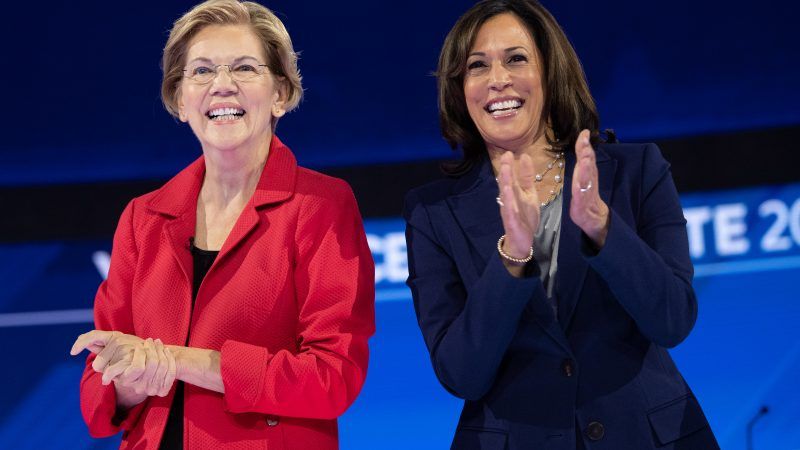Calling Out Kamala Harris' Record as a Draconian Prosecutor Isn't a 'Distortion'
It's the truth.

Presidential candidate Sen. Kamala Harris (D–Calif.) defended her criminal justice record against what she called "distortions" at Thursday's Democratic debate, but she once again avoided offering explanations for past positions that critics say undercut her claim that she was a progressive prosecutor.
ABC News correspondent and debate moderator Linsey Davis noted, quite pointedly, that Harris' recently released criminal justice plan contradicted many of her past positions as California's attorney general.
"It does contradict some of your prior positions. Among them, you used to oppose the legalization of marijuana, now you don't," Davis said. "You used to oppose outside investigations of police shootings, now you don't. You said that you've changed on these and other things because you were, quote, 'swimming against the current and thankfully, the currents have changed.' But when you had the power, why didn't you try to affect change then?"
"There have been many distortions of my record," Harris responded. "Let me be very clear. I made the decision to become a prosecutor for two reasons. One, I wanted to protect people and keep them safe. And second, I was born knowing how this criminal justice system in America has worked, in a way that has been informed by racial bias, and I can tell you extensively about the experiences I and my family have personally had."
"I made the decision that if I was going to have the ability to reform the system I'd do it from the inside," Harris continued.
She touted her work to divert people arrested for drugs into a job program, as well as a body camera initiative for police and police training on racial bias.
"Was I able to get enough done? Absolutely not," Harris said, "but my plan has been described by activists as a bold and comprehensive plan."
Harris' record on criminal justice has been a sore spot for her. As the Democratic Party has swung to the left on the issue of criminal justice, her actions as California's top prosecutor have come under scrutiny. As Reason's Elizabeth Nolan Brown summed it up in a recent cover story, echoing a persistent criticism and internet meme, "Kamala is a cop":
During her 28-year tenure as a county prosecutor, district attorney (D.A.), and state attorney general (A.G.), Harris proved quite willing to live up to the epithet. In the public eye, she spoke of racial justice and liberal values, bolstering her cred as one of the Democratic Party's rising stars. But behind closed doors, she repeatedly fought for more aggressive prosecution not just of violent criminals but of people who committed misdemeanors and "quality of life" crimes.
Every attorney general fights for state power and police prerogatives. It's part of the job. But over and over again, Harris went beyond the call of duty, fighting for harsher sentences, larger bail requirements, longer prison terms, more prosecution of petty crimes, greater criminal justice involvement in low-income and minority communities, less due process for people in the system, less transparency, and less accountability for bad cops.
Instead of apologizing or even acknowledging this, however, her campaign has glossed over these troubling parts of her record, as she did again on the debate stage.
As Reason wrote about her most recent memoir, The Truths We Hold, Harris paints herself as a progressive prosecutor while side-stepping explanations for why her office did things like defend egregious prosecutorial misconduct, or appeal the removal of the entire Orange County district attorney's office from a high-profile death penalty case after a bombshell report revealed an unconstitutional jailhouse snitch program.
See also: Reason TV's video "Kamala Harris Hopes You'll Forget Her Record as a Drug Warrior & Draconian Prosecutor."


Show Comments (31)